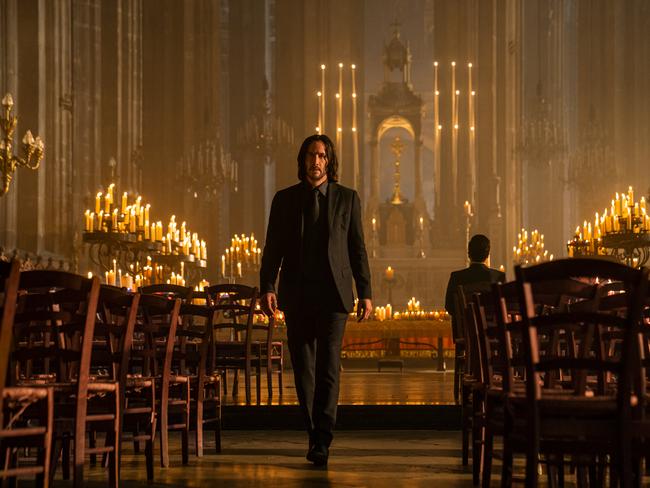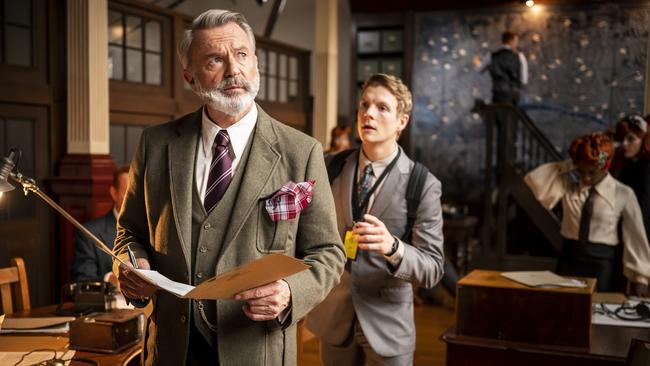John Wick 4, Keanu Reeves and sea of bullets
Three hours of relentless shooting and little acting makes the fourth film in the Wick franchise an epic disappointment.

John Wick: Chapter 4 (MA15+)
In cinemas
★★½
I’m unsure what to make of John Wick: Chapter 4. I’m a fan of the franchise about a bulletproof hit man with a hit on him and I have no argument with suggestions that Keanu Reeves is one of the nicest humans on the planet.
And yet. Is this fourth instalment in the series monotonous? To use John Wick’s trademarked quote: “Yeah.” Is the plot rudimentary? Is the acting almost non-existent? Yeah. Yeah.
Is the violence so desensitised that long parts of the movie look like a video game in which participants score extra points for shooting people in the head? Yeah.
Fans may say that this has always been the case and it’s what makes JW different from, say, James Bond or Tom Cruise’s Ethan Hunt. Fair enough but I think the previous films have more emotional depth to them, and more humour.
All four films were directed by stuntman-turned-director Chad Stahelski, who was Reeves’s stunt double in the original Matrix back in 1999. Indeed, they are the only films he has directed.
Each time the movie has become longer and – to Stahelski’s good fortune – made more money at the box office. JW4 runs to 169 minutes. Is that too long? Double yeah.
This is a direct sequel to JW3 (2019), which ended with – spoiler alert – John Wick (Reeves) being shot by Winston Scott (Ian McShane, who returns), manager of the New York hotel preferred by the criminal elite. He survived, joined forces with former gangland boss the Bowery King (Laurence Fishburne, underused this time around) and vowed to wreak revenge on the High Table, a sort of criminal version of the UN.
In the new movie, Wick heads to Morocco and he and his gun make a poor decision that leads to the High Table being ruled by the imperious Marquis Vincent de Gramont (Bill Skarsgard), who goes to the head of the long queue of people who want Wick snuffed out.
He assigns the job to a hit man named Caine (Donnie Yen), who is blind and a friend of Wick’s. He also has a daughter. He’s told to take a life or lose a life.
Caine has competition. As there’s a huge bounty on Wick’s head, just about everyone with a gun goes after him. A mercenary called, in a nod to Homer, Mr Nobody (Shamier Anderson) joins the hunt and, as is required in the JW franchise, he has a dog.
And that’s about it. Cue three hours that involves lots of shooting and little acting. (With the exception of Scott Adkins, in a fat suit, as a German baddie. Best performance in the most interesting sequence in the film.)
For the first time, I found the violence a tad repellent.
The ending, which includes Wick having a Sisyphean moment on some stairs in Paris, includes a big surprise. Whether it leaves open another JW movie is anyone’s guess.
I’ll finish with a tribute to Lance Reddick, who died on March 17 at age 60. He returns as the hotel concierge Charon, another of the mythological/biblical/classical name borrowings in the series.
You know the sort of actor you are glad to see in any film? Reddick was one for me. He was never a star – he seemed semi-stereotyped as police chief, following the TV series The Wire – but it was always a pleasure to see him on screen.
Early in JW4 he says, “It’s been an honour, my friend.” It has been indeed.
-
The Portable Door (PG)
In cinemas, streaming on Stan from April 7
★★★½
Set in London, filmed on the Gold Coast, The Portable Door has a magical cast of actors who bring a lot of fun to a family-friendly comic fantasy.
Here’s Dennis Tanner (Sam Neill), a tyrannical middle manager at the London firm JW Wells & Co, greeting a new intern who he and the rest of the board interviewed the previous day. “I was hoping you were dead.”
As the intern is still breathing, Mr Tanner, who insists on the honorific, has to show him around the premises. “Even the tiniest mites that inhabit this grotty carpet on which we walk are more important than you.”
Here’s the chief executive, Humphrey Wells (dual Oscar winner Christoph Waltz), rhapsodising about his new business plan. “Why waste our time helping ungrateful sods who are just going to die anyway?”
If you are imagining vaudevillian arched eyebrows, you are not far wrong.
Other well-known antipodean actors add to the hocus-pocus, including Damon Herriman, Miranda Otto, Chris Pang, Jessica De Gouw and Rachel House.
What the company does, and who the ungrateful sods are, is a mystery, including for that new intern, Paul Carpenter (Irish actor Patrick Gibson).
“What is it you do here?” he asks Mr Tanner. “We do what we can,’’ he replies with a hint of desperation.

There’s a feeling the firm is not what it used to be. Another puzzle, or perhaps whodunnit, is that the firm’s founding fathers, Mr Humphrey Snr and Mr Tanner Snr, have disappeared.
Paul must share an office with Sophie Pentigel (Sophie Wilde), another just-hired intern, or “new blob of insignificance”, to quote Mr Tanner.
However, Paul and Sophie do have certain skills, ones that Mr Humphrey hopes will resurrect his grand plan, Operation Fine Print, “the most audacious influence campaign in history”.
At a time when influencer seems to be a legitimate profession, this is timely. As a small example, Sophie hates coffee, licorice and jazz … until, unknowingly used as a guinea pig, she loves all three.
How her mind can be changed overnight goes to the firm’s core business, which Mr Humphrey wants to expand. He promises that, for the right price, he can change the minds of “the masses”.
First, though, he needs to find something that has gone missing: the portable door of the title. It’s a door that leads to, well, anywhere and it’s integral to his scheme.
It’s somewhere in the building and it is Paul’s job to locate it.
This movie is directed and written by two Australian actors who have moved behind the camera: Jeffrey Walker (director) and Leon Ford (writer).
The cinematographer is the Oscar-nominated Australian Don McAlpine, who started his career in 1972 with Bruce Beresford’s The Adventures of Barry McKenzie.
The 116-minute movie is an adaptation of the 2003 novel of the same name, the first of seven in a series by British writer Tom Holt.
Readers of the book will know what the firm does and why its leaders seem not quite ordinary. So will fans of Gilbert and Sullivan’s comic opera The Sorcerer, from which Holt borrowed JW Wells & Co.
Early in the film, there are hints some sort of magic is involved. Paul thinks he sees a baby dragon scuttling behind some filing cabinets. Sophie thinks she sees a mouse.
The filmmakers, however, keep most of it undercover for quite a while, so it comes as a delightful surprise to the uninitiated. This movie, a Stan original, is a spirited, fantastical entertainment for young and old.


To join the conversation, please log in. Don't have an account? Register
Join the conversation, you are commenting as Logout